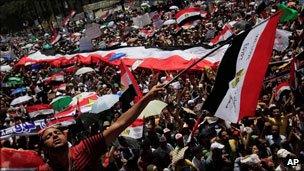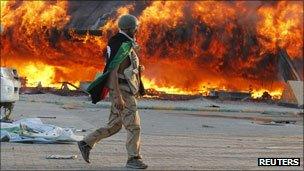9/11: How secure will the US feel in 2021?
- Published

The Arab spring has changed US relations with the region
It's been 10 years since a colossal act of violence on US soil led to two wars and deepened global tensions. So how secure will the world feel in 2021, asks PJ Crowley, former US assistant secretary of state?
Ten years after 9/11, Osama Bin Laden is dead, his virulent theology largely discarded and the remnants of his organisation under constant pressure.
While it retains an ability to inflict harm, at this moment, it does not appear al-Qaeda could muster another attack on the scale of 11 September.
Whether al-Qaeda or its affiliates continue to wither or remain dangerous and relevant will depend on several factors.
Three issues stand out: first, the direction of the ongoing debate within Islam; second, the success of the extraordinary Arab transitions across the Middle East and North Africa; and third, sustaining current security efforts despite the financial crisis, and understanding that we are still at risk.
Over the decade, a debate surged across the Muslim world about the meaning and practice of religion in the modern world. By increasingly large percentages, the citizens of Muslim-majority countries rejected al-Qaeda's violent tactics. Muslims came to realize that they were al-Qaeda's primary victims.
They recognized that al-Qaeda had hijacked not just four airplanes but their religion as well. And they began to take it back.
The exclamation point regarding al-Qaeda's decline has been the remarkable Arab transitions in Tunisia, Egypt and Libya. The heroic protest movements across the region, including Syria, Yemen and Bahrain, represent a compelling counter-narrative. Societies are being transformed and al-Qaeda has had nothing to do with it.
There is no better way to reduce the threat of violent political extremism than supporting these transitions. They will need sustained outside assistance to expand political, economic and social opportunity. Educated and well-connected populations, bulging with young people under 25, need hope but even more, they need jobs.
Supporting job creation in the Middle East with so much unemployment in the United States and Europe will be a tough political sell. In fact, given the push to reduce government spending and close budget deficits, it will be tempting to use the death of Bin Laden to declare victory and pull back, much like we did after the Cold War.
One of the past decade's major successes is the shared international perspective regarding the threat, along with improved international coordination and cooperation. Intelligence has improved; extremists killed or imprisoned; many (but not all) safe havens closed; borders strengthened; and financing curtailed. Our defences are better than they were 10 years ago, but the challenge is far from over.
Future hopes
Economic and political reform in the Middle East, and economic recovery in the West, cannot be viewed in zero-sum terms. Supporting these reform movements with civilian assistance is certainly cheaper than military action, most notably the $800bn (£499bn) US-led intervention in Iraq.
Should military action be required in the future, the recent and limited Nato-led operation in Libya is a more suitable model.
So what should we hope to achieve in the coming decade, but also expect?
Ideally, following initial elections in Tunisia, Egypt and Libya in 2011 and 2012, representative governments emerge that will begin to enact meaningful political, economic and social reforms. Across the decade, the movement spreads to a broader cross-section of countries. As a norm, political power is earned, not inherited; the peaceful transfer of power is the rule, not the exception.

The war in Libya could be a model, says Crowley
Economic recovery is achieved across the West. A key pillar is reduced consumption of fossil fuels and lower oil prices, changing the vicious cycle of energy production, corruption, autocratic governance and political extremism.
The massive transfer of wealth from energy consumers to energy exporters slows, meaning fewer resources to fund extremists. Pressure for reform continues to build in Iran and Saudi Arabia, two countries that will likely holdout the longest.
In the United States, to overcome the existing political stalemate, a new commission of national security elders convenes to outline a post-Afghanistan strategy for combating violent political extremism.
The administration and Congress commit to acting on its recommendations and provide necessary resources. The commission highlights the on-going challenges of cyber-security, critical infrastructure protection and the spread of bio-technology.
It stresses the importance of the rule of law, affirms the use of civilian courts and military tribunals to try terrorism suspects and rejects the use of enhanced interrogation techniques. It recommends the closure of Guantanamo.
Lessons
The commission predicts the United States will be attacked again. Late in the decade, we are, through a series of small-scale attacks employing suicide bombers and truck bombs in multiple cities, along with a computer virus that hampers emergency responders
But unlike 9/11, we are prepared. We are resilient. Despite significant loss of life, we respond effectively and recover rapidly. We don't engage in a political blame game. We don't overreact.
We learn the right lessons and adjust our defences without overhauling them. We have confidence they are as good as they can be.
We refuse to change who we are or how we live.